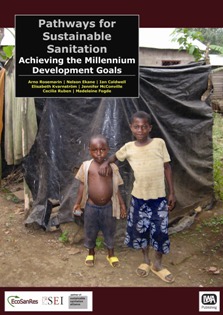 Pathways
for Sustainable Sanitation - Achieving the Millennium Development Goals Pathways
for Sustainable Sanitation - Achieving the Millennium Development Goals
A new publication from EcoSanRes, published by IWA.
Authors: Arno Rosemarin, Nelson Ekane, Ian Caldwell, Elisabeth Kvarnström,
Jennifer McConville, Cecilia Ruben and Madeleine Fogde The report
is a product arising from the work of the Sustainable Sanitation Alliance which
was initiated prior to the International Year of Sanitation in 2008 in an
attempt to inject sustainable development ideas into the sanitation sector. It
functions as a vision document for those policymakers, researchers and
practitioners that are striving towards fundamental reform and improvements
within the sanitation sector in both rural and urban populations in all
countries of the world. It reviews the global progress being made towards
achieving the Millennium Development Goal (MDG) target on sanitation. A
literature review is presented on sanitation provision including human health
impacts and the estimated costs and benefits of achieving the MDG target.The
report also provides a critique in that the UN has not yet introduced the
concept of sustainability into the MDG programme in general and in particular
into the sanitation sector which is highly dysfunctional and suffering from
limited political leadership at both the local and global levels. It introduces
the various sustainable sanitation options available and what approaches can be
taken to improve sanitation systems - not just toilets which are only a small
part of the overall system of food, nutrients and water cycles.
The study estimates the numbers of urban and rural households, including slum
populations that are being targeted in all world regions. It also evaluates the
historic trends in morbidity and mortality linked to diarrhoea arising from lack
of functioning sanitation services comparing these to the UN data on sanitation
coverage. The report estimates the potential fertiliser replacement capacity
that reuse of human excreta can have for all world regions. Finally it provides
a vision for future development within the sector where more sustainable options
like source separation and reuse are promoted giving positive environmental or
"green" impacts but also catalysing greater involvement and understanding on the
part of individuals in society.
Important links:
|